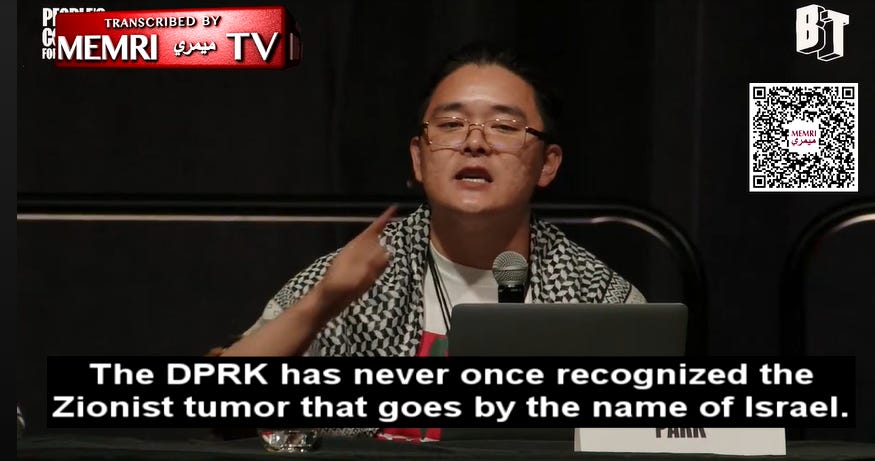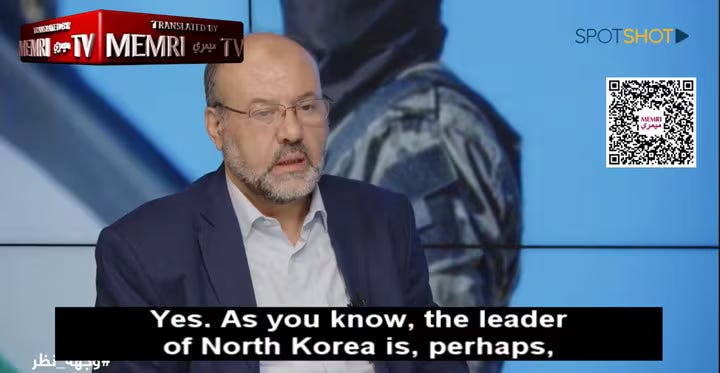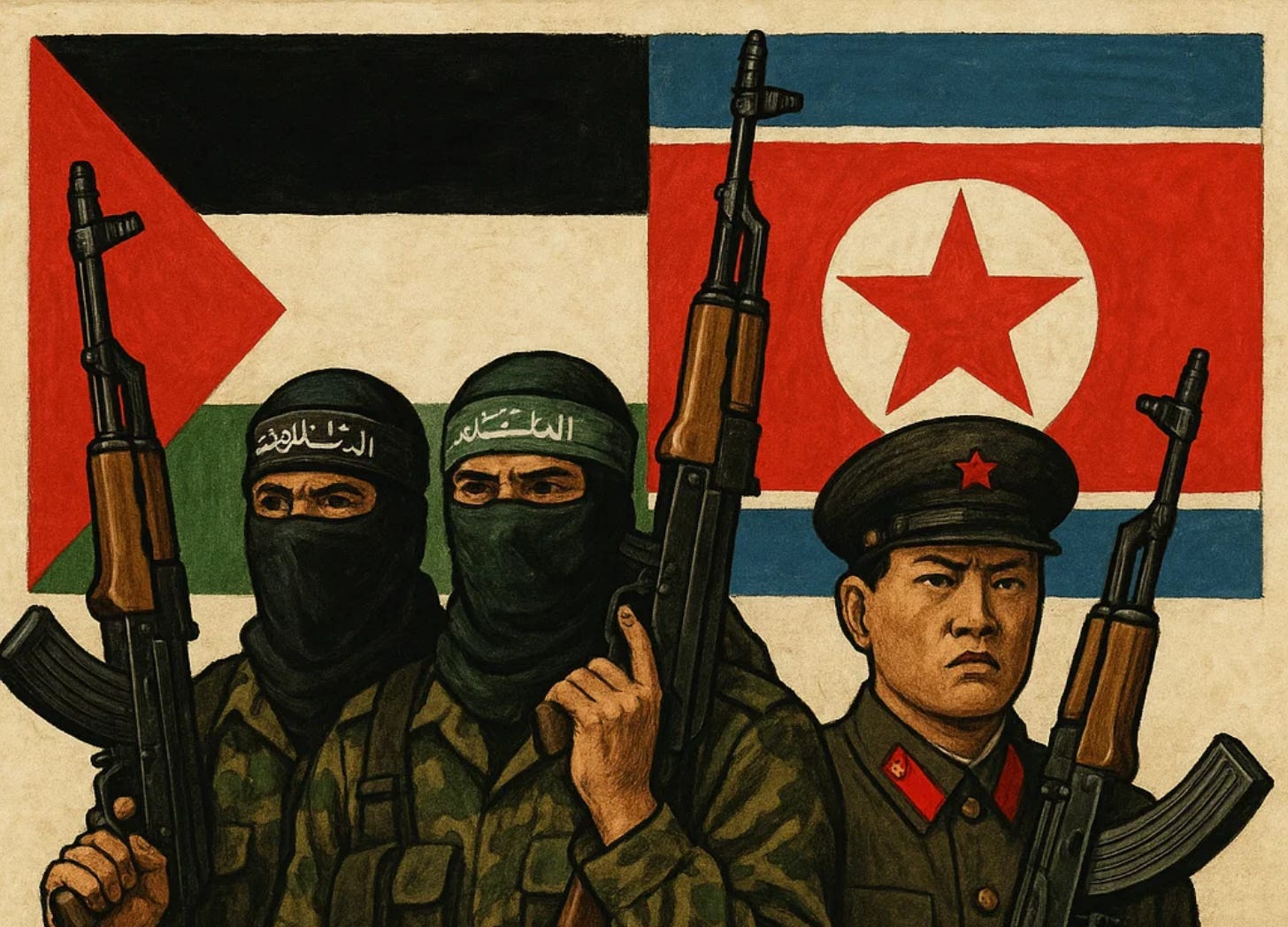Pyongyang’s Shadow: Unpacking North Korea’s Ties to the Pro-Palestine Movement
From revolutionary solidarity to deadly weaponry: How North Korea contributes to Middle East turmoil
The recent revelation of an upcoming pro-North Korea conference in New York, featuring affiliates of Palestinian terror groups, highlights a hidden yet powerful connection between Pyongyang and Gaza's violent factions. While global attention often falls on Iran and Russia’s support for extremists in the region, North Korea has, over six decades, built a track record of ideological, financial, and material backing for Palestinian groups—networks now implicated in some of the most destabilizing acts of terror in recent history. As new evidence emerges of North Korean weapons on Israeli soil and ongoing intelligence probes spotlight Pyongyang’s covert involvement, this alliance stands out as a formidable, under-scrutinized force linking East Asian authoritarianism to the bloodiest edges of the Middle Eastern conflict.

Roots of an Alliance: Where It Began
North Korea’s involvement with Palestinian terrorist organizations traces back to the 1960s, when links were established with Yasser Arafat’s Palestine Liberation Organization (PLO) and the Marxist-Leninist Popular Front for the Liberation of Palestine (PFLP). Throughout the 1970s and 1980s, Pyongyang supplied arms, military training, and financial support to a network of Palestinian terrorist organizations—many designated as terror groups by the US, EU, UK, and Israel.

This cooperation included not only modest arms shipments but also technical expertise. PFLP founder George Habash and his cadres visited Pyongyang for consultations and support, reflecting the North’s strategy of exporting militarized revolution as a means to challenge Western-aligned states.
The Modern Pivot: Hamas, the “Axis of Resistance,” and Renewed Trade
By the 1990s, after the Oslo Accords and a global thaw in Cold War hostilities, North Korea’s overt presence waned. However, it reemerged forcefully after Hamas took control of Gaza in 2007. Reports indicate that in 2014, amid rising conflict with Israel, Hamas covertly procured rockets and communications equipment from North Korea, leveraging intermediaries in Lebanon and Iran to evade sanctions.
More broadly, North Korea’s partnership with Iran and Syria cemented a web of military and technological exchanges, which facilitated arms trafficking to Hamas, Palestinian Islamic Jihad (PIJ), and Hezbollah—all designated terrorist organizations by the US, EU, and Israel.
This clandestine trade directly violates multiple UN Security Council resolutions and places North Korea in violation of global prohibitions against arming terrorist groups. Shipments have been intercepted as far afield as the UAE and Thailand, with caches traced back to intended recipients in Gaza and Lebanon
Recent Evidence: Weapons, Tunnel Warfare, and Intelligence Confirmation
The October 7th, 2023, Hamas-led attack on Israel propelled North Korea’s role into new focus. The Israeli Defense Forces, corroborated by South Korean and US intelligence, recovered large quantities of North Korean rocket-propelled grenades (RPGs) and other armaments in Gaza and Israel, some inscribed with Korean characters. South Korea’s National Intelligence Service explicitly confirmed the use of North Korean-made F-7 RPGs by Hamas fighters in Gaza.

More than 100 family members and victims of the October 7 attack have filed lawsuits in U.S. federal court against North Korea, Iran, and Syria, alleging these governments supplied Hamas with money, weapons, and training that enabled the assault.
Since the early 2010s, it has been speculated that North Korean tunneling methods and technologies contributed to the construction of Gaza’s tunnel network. These techniques may have been transmitted through intermediaries such as Iran or Hezbollah, though direct involvement by North Korean specialists remains a possibility.
As Victor Cha, former director for Asian affairs at the White House National Security Council, noted in 2014: 'Hamas' expansive tunnel network almost certainly benefited from external assistance, either directly from North Korea or through Iran,' emphasizing that severing these support channels was essential for achieving U.S. and Israeli objectives in dismantling the infrastructure.
Following the attack, Kim Jong Un reportedly ordered officials to "comprehensively aid Palestine" amid the war between Hamas and Israel, according to South Korean intelligence assessments.
Contemporary Activist Connections
The North Korean connection to Palestinian activism has extended beyond direct state support to influence contemporary pro-Palestinian movements. In May 2024, an anti-Israel protester at New York University publicly credited North Korea for providing military training to the U.S.-designated terror group, the Popular Front for the Liberation of Palestine (PFLP). The protestor stated, "The DPRK has actively armed and trained Palestinian resistance for decades”, and “The PLO, PFLP and the DFLP have trained troops by the DPRK.”

The Nodutdol Network: Spreading North Korean “Anti-Imperialist” Rhetoric
A MEMRI investigation uncovered efforts by the Korean-American organization Nodutdol to propagate North Korean “anti-imperialist” rhetoric within Pro-Palestinian movements. Nodutdol activist Ju-Hyun Park has delivered speeches at major Pro-Palestinian events, including the People's Conference for Palestine in Detroit on May 26, 2024, drawing explicit parallels between North Korean resistance to US "occupation" and Palestinian resistance to Israeli "occupation."
During his speech, Park praised North Korea’s support of Palestinian terrorist groups, saying, “The DPRK has never once recognized the Zionist tumor that goes by the name of Israel,” and emphasizing what he called the “material” solidarity between Koreans and Palestinians.

Nodutdol published a statement that explicitly frame both Korea's division and Palestine's partition as products of U.S. “imperialism”, creating an ideological bridge that links North Korean state propaganda with Western Pro-Palestinian activism. The organization actively encourages anti-Israel protesters to support the DPRK, particularly on US campuses, by drawing these historical parallels.

Convergence of Pro-North Korean and Pro-Palestinian Groups at Upcoming NYC Summit
A three-day conference set to take place in New York City, “The People’s Summit for Korea”, scheduled for July 25–27, 2025, highlights the troubling convergence of pro-North Korean and pro-Palestinian activist groups. The summit will feature individuals with ties to U.S.-designated terrorist organizations, including Helyeh Doutaghi, a member of Samidoun, a group linked to the PFLP. Doutaghi's participation, alongside Nodutdol, further raises concerns about the ideological direction of the summit.
Nodutdol member, Ju-Hyun Park, will also speak at the event. Plenary sessions at the summit include “The Long Revolution of the Democratic People’s Republic of Korea” and “Toward a United Front: U.S. Out of Everywhere,” signaling a focus on radical anti-American and pro-North Korean ideologies.

Additionally, groups funded by CCP-linked financier Neville Roy Singham — such as People’s Forum, BreakThrough News, CODEPINK, and ANSWER Coalition — are heavily represented. Singham's network has long been known for advancing the agendas of U.S. adversaries.

Political Rhetoric and Diplomatic Support
North Korean state media and official statements consistently frame the Palestinian cause as an anti-imperialist struggle, frequently denouncing Israeli and US actions as “crimes against humanity.”
Senior Hamas officials have recognized North Korea as one of their allies, reinforcing its role in an informal network of anti-Western, anti-Israel actors spanning the Middle East and Asia. In an interview from November 2023, senior Hamas official Ali Baraka acknowledged North Korea as a key ally, further solidifying its place in the informal network of anti-Western, anti-Israel actors across the Middle East and Asia. Baraka noted that America's enemies are growing closer, and the day may come when they join forces, making the U.S. "a thing of the past." He specifically pointed out that North Korea is the only country capable of striking America directly, affirming that the DPRK is part of Hamas's alliance.

Looking Ahead: Broader Implications in a Shifting Geopolitical Landscape
The deepening relationship between North Korea and pro-Palestinian groups must be seen against the backdrop of an emerging global alliance of authoritarian and anti-Western states. As North Korea grows closer to Russia and Iran—not only in the Middle East but also in Ukraine—its willingness and capacity to arm, advise, and empower designated terror groups threatens to introduce new levels of sophistication and lethality to future conflicts. This evolution underscores the urgent need for global attention and a recalibration of counterterror and sanctions strategies in an increasingly multipolar world.



